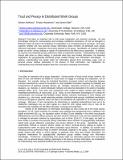Files in this item
Trust and privacy in distributed work groups
Item metadata
| dc.contributor.author | Anthony, Denise | |
| dc.contributor.author | Henderson, Tristan Nicholas Hoang | |
| dc.contributor.author | Kitts, James | |
| dc.contributor.editor | Liu, Huan | |
| dc.contributor.editor | Salerno, John J. | |
| dc.contributor.editor | Young, Michael J. | |
| dc.date.accessioned | 2011-10-31T10:24:48Z | |
| dc.date.available | 2011-10-31T10:24:48Z | |
| dc.date.issued | 2009-03 | |
| dc.identifier | 6055544 | |
| dc.identifier | 6dbd65b9-1e38-4ab0-a03b-86674e24a66d | |
| dc.identifier | 000265381400004 | |
| dc.identifier | 84900584378 | |
| dc.identifier.citation | Anthony , D , Henderson , T N H & Kitts , J 2009 , Trust and privacy in distributed work groups . in H Liu , J J Salerno & M J Young (eds) , Social Computing and Behavioral Modeling . Springer , New York , pp. 16-23 , Second International Workshop on Social Computing, Behavioral Modeling, and Prediction , Phoenix, Arizona , United States , 31/03/09 . https://doi.org/10.1007/978-1-4419-0056-2_4 | en |
| dc.identifier.citation | conference | en |
| dc.identifier.isbn | 978-1-4419-0055-5 | |
| dc.identifier.isbn | 978-1-4419-0056-2 | |
| dc.identifier.uri | https://hdl.handle.net/10023/2033 | |
| dc.description | Proceedings of the 2nd International Workshop on Social Computing, Behavioral Modeling and Prediction | en |
| dc.description.abstract | Trust plays an important role in both group cooperation and economic exchange. As new technologies emerge for communication and exchange, established mechanisms of trust are disrupted or distorted, which can lead to the breakdown of cooperation or to increasing fraud in exchange. This paper examines whether and how personal privacy information about members of distributed work groups influences individuals' cooperation and privacy behavior in the group. Specifically, we examine whether people use others' privacy settings as signals of trustworthiness that affect group cooperation. In addition, we examine how individual privacy preferences relate to trustworthy behavior. Understanding how people interact with others in online settings, in particular when they have limited information, has important implications for geographically distributed groups enabled through new information technologies. In addition, understanding how people might use information gleaned from technology usage, such as personal privacy settings, particularly in the absence of other information, has implications for understanding many potential situations that arise in pervasively networked environments. | |
| dc.format.extent | 45293 | |
| dc.language.iso | eng | |
| dc.publisher | Springer | |
| dc.relation.ispartof | Social Computing and Behavioral Modeling | en |
| dc.subject | QA75 Electronic computers. Computer science | en |
| dc.subject.lcc | QA75 | en |
| dc.title | Trust and privacy in distributed work groups | en |
| dc.type | Conference item | en |
| dc.contributor.institution | University of St Andrews. School of Computer Science | en |
| dc.identifier.doi | https://doi.org/10.1007/978-1-4419-0056-2_4 | |
| dc.identifier.url | http://sbp.asu.edu/ | en |
This item appears in the following Collection(s)
Items in the St Andrews Research Repository are protected by copyright, with all rights reserved, unless otherwise indicated.

